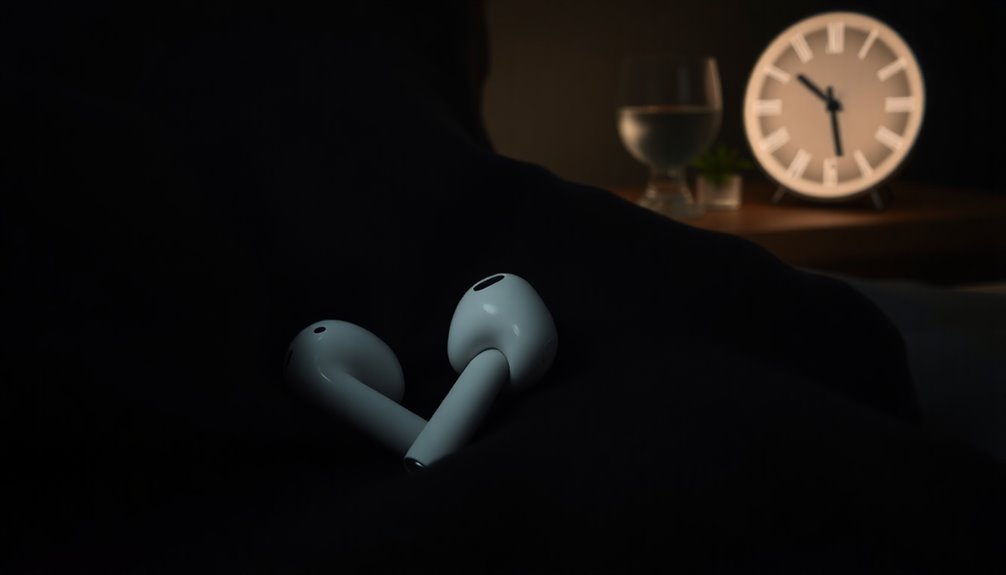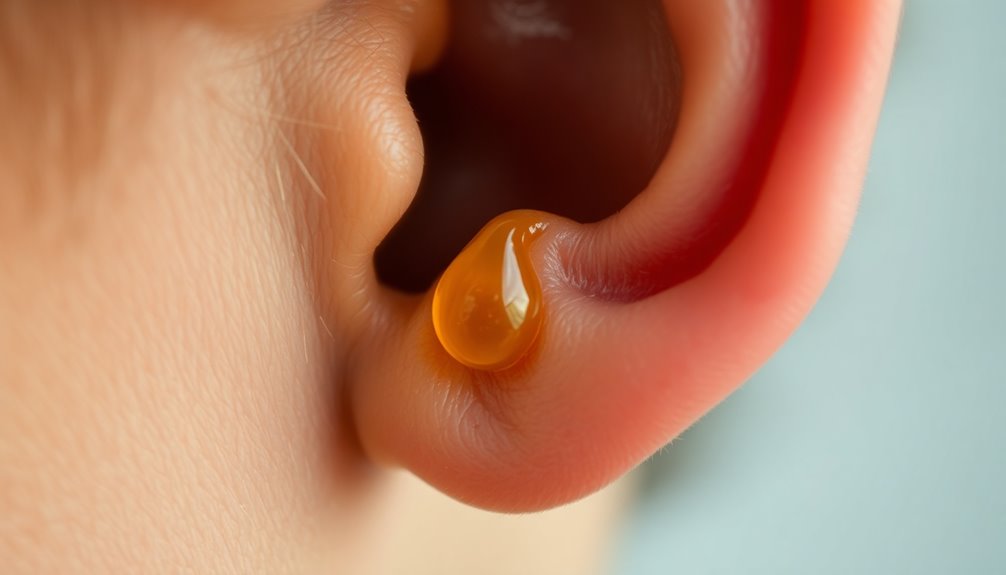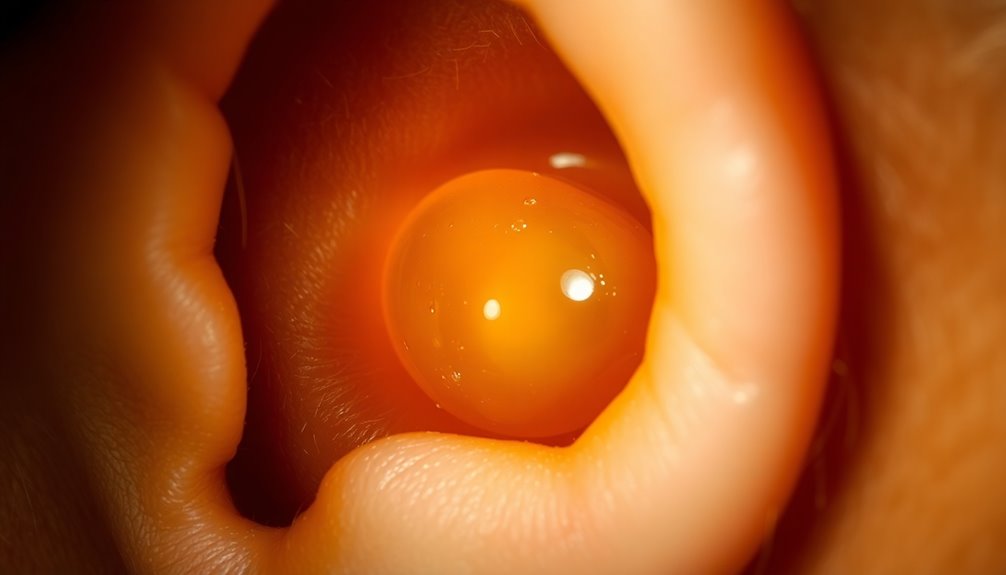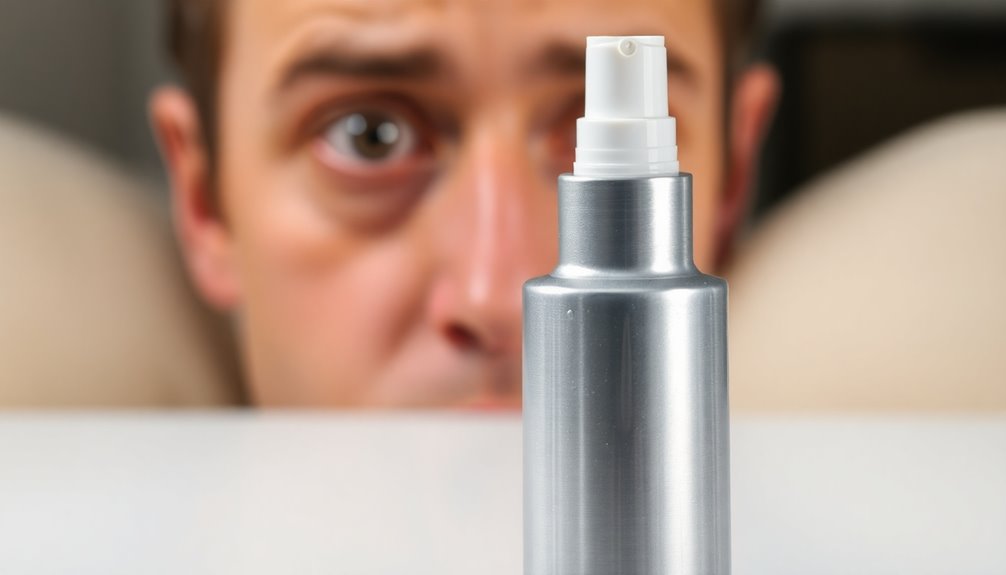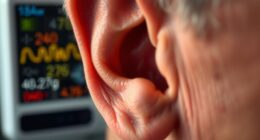Sleeping with AirPods in isn't the best idea. They can trap moisture and promote bacterial growth, increasing your risk of ear infections. Plus, prolonged use may lead to discomfort and even hearing issues due to earwax buildup. It can disrupt your sleep cycles, affecting your rest and potentially creating a dependency on them for falling asleep. Side sleeping can cause earaches, and you might wake up with soreness. While they're popular for audio bliss, there are safer alternatives for better sleep. Stick around, and you'll find tips on how to protect your ear health while enjoying your favorite sounds.
Key Takeaways
- Sleeping with AirPods can lead to ear pain and soreness, especially for side sleepers, due to discomfort and potential dislodging.
- Prolonged use increases the risk of ear infections from trapped moisture and bacteria, emphasizing the need for regular cleaning.
- High volume exposure during sleep can contribute to noise-induced hearing loss, making it essential to keep volume levels safe.
- Dependency on AirPods for sleep can disrupt natural sleep cycles, leading to anxiety about falling asleep without them.
- Physical discomfort from misfitting earbuds may lead to disrupted sleep quality, reinforcing the importance of comfortable designs for nighttime use.
Infections and Ear Health

When you wear earbuds, you might not realize how they can contribute to ear infections and affect your ear health. These little devices can trap moisture and fluid, creating a warm, humid environment that's perfect for bacterial growth. If you're using earbuds after sweating or showering, you're increasing the risk of infection, especially with prolonged use. Additionally, prolonged earbud use without hygiene can lead to increased ear health issues that may complicate your condition.
Another issue is how earbuds can push earwax deeper into your ear canal, leading to discomfort and a clogged feeling. This buildup can cause ear pain, itchiness, and even hearing loss if it gets severe.
You also need to consider the accumulation of bacteria and germs on your earbuds. If you don't clean them regularly, they can harbor viruses and fungi that may enter your ear canal. Touching your earbuds with unclean hands or sharing them with others only adds to the risk.
If you experience symptoms like ear pain, drainage, or a clogged feeling, it's crucial to seek treatment. Avoid using earbuds while dealing with an ear infection or during the healing process to protect your ear health.
Impact on Sleep Quality
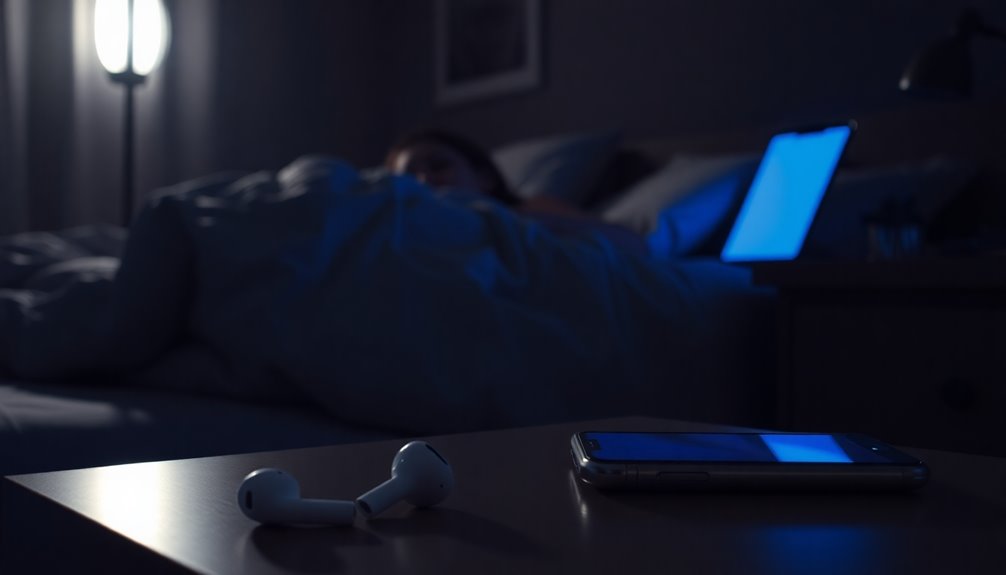
Using AirPods while sleeping might seem convenient, but they can significantly impact your sleep quality. For starters, the presence of earbuds can disrupt your sleep cycle, particularly affecting deep sleep stages. This interference can lead to less restorative rest, leaving you feeling groggy the next day. If you sleep on your side, discomfort or earache can further disturb your deep sleep, reducing both the quality and duration of your slumber. Additionally, extended use without cleaning can contribute to ear health issues that may also disrupt your sleep due to discomfort or pain.
Physical discomfort is another concern. Misfitting AirPods can cause soreness or a feeling of fullness in your ears. The pressure against your ear can be painful, and if they dislodge, you risk injury or even having them lodged in your ear canal.
Moreover, relying on AirPods to fall asleep can create a dependency, making it challenging to doze off without them. This dependency can adversely affect your sleep quality when you can't use the device. Even though listening to calming sounds, music, or podcasts may help you relax, they can distract you during deep sleep stages, ultimately impacting your overall sleep experience.
Potential for Hearing Damage
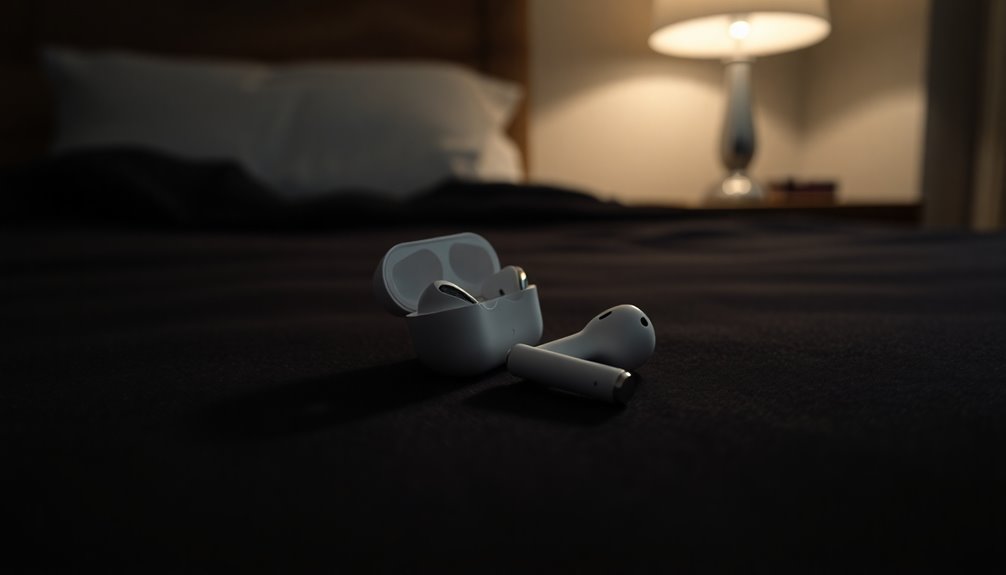
Sleeping with AirPods in can pose a significant risk to your hearing health. Listening to audio at high volumes, especially during prolonged periods, can lead to noise-induced hearing loss. The World Health Organization recommends a safe exposure limit of 85 decibels for a maximum of eight hours daily. If you're cranking up the volume above 90 decibels, even for shorter durations, you're increasing your risk for hearing impairments.
Consider how long you're wearing those earbuds while you sleep. Regular use over three hours a day at high volumes can lead to tinnitus, a ringing in your ears that can become permanent. Additionally, in-ear designs like AirPods can trap moisture in the ear canal, escalating your hearing risks. Instead, opt for over-the-ear headphones or custom-fitted sleeves that may provide more comfort and safety.
To protect your hearing, keep the volume at a safe level and take breaks from wearing your earbuds. The longer and louder the exposure, the higher your risk of irreversible hearing damage. Prioritizing your ear health now can save you from serious consequences later. Using earbuds designed specifically for sleep can also help mitigate some of these risks while allowing you to enjoy calming sounds.
Physical Discomfort and Injury
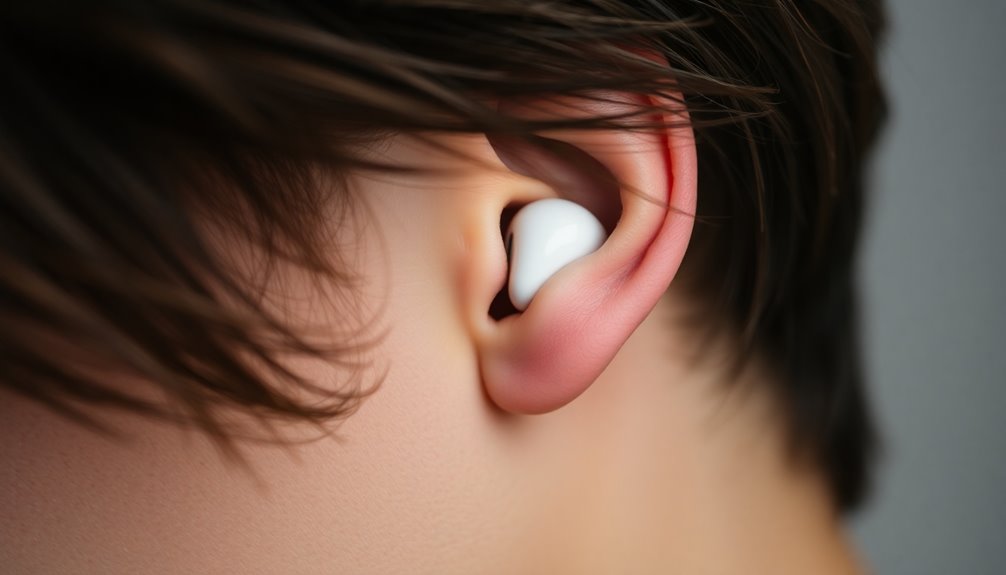
Wearing AirPods while you sleep can lead to various forms of physical discomfort and even injury. Prolonged wear often causes ear pain or soreness, as the earbuds put pressure on your ear canal. This added weight can create an uncomfortable feeling, making it tough to find a comfortable sleeping position. If you're a side sleeper, the risk increases; the AirPods can easily become dislodged, pressing against your ear or even getting lodged in the canal.
Movement during sleep can displace the AirPods, heightening the chance of injury. Plus, if they don't fit correctly, they're more likely to come loose, increasing the potential for discomfort. As you toss and turn, you might also find that the earbuds interfere with your sleep quality, disrupting your natural sleep cycle. Additionally, wearing AirPods traps moisture and bacteria in your ear, potentially leading to infections. The warm, humid environment they create is perfect for bacterial growth, making regular cleaning essential. This is particularly concerning because wearing them for prolonged periods can also expose you to high levels of RF radiation, which poses additional health risks. Neglecting ear hygiene can further exacerbate ear health issues, leaving you with more than just a restless night. So, consider the risks before settling in with your favorite earbuds.
Battery Safety Concerns
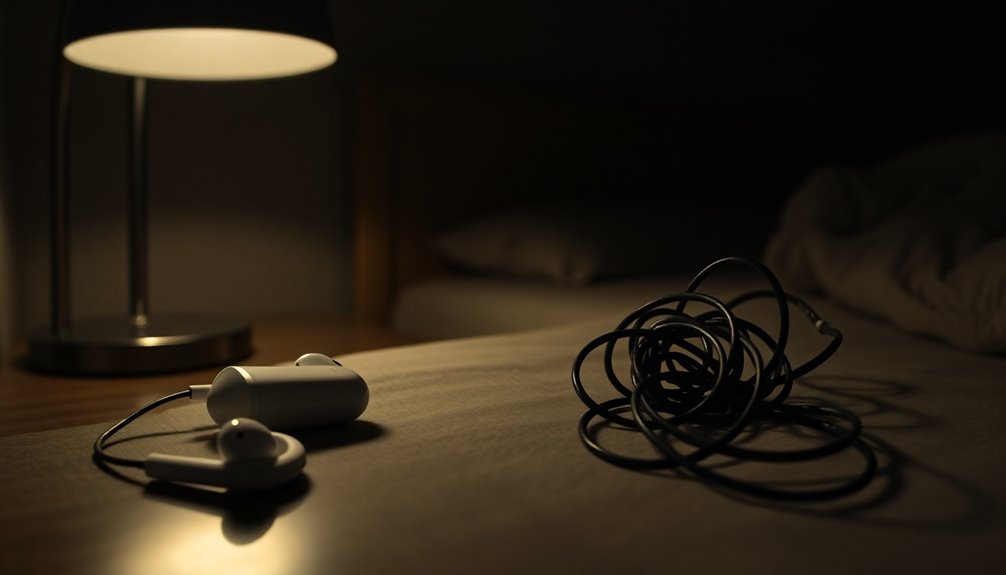
Battery safety concerns are critical to consider when you decide to sleep with AirPods in. Overheating is a primary risk; your AirPods can get too hot, especially during prolonged use or if they're left in direct sunlight. High temperatures can damage the battery and shorten its lifespan. Although AirPods have built-in safety features to shut off if they overheat, it's best to avoid situations that can lead to this. It's important to remember that consistent overheating may signal an underlying problem that requires attention.
Charging also poses risks. If you use your AirPods while charging or leave them plugged in for too long, the temperature can rise significantly. Always unplug them if they feel hot and ensure you're charging in a safe temperature range.
Lastly, avoid attempting to replace the batteries in your AirPods or charging case, as this can cause overheating and other hazards. Damaged batteries can lead to severe safety issues, so keep your devices out of reach of children to prevent ingestion risks. Proper disposal of used batteries is also essential for safety. Always store your AirPods in shaded, room-temperature spots to maintain battery integrity. Taking these precautions can help ensure your AirPods remain safe while you sleep.
Moisture and Earwax Issues

Using AirPods while you sleep can lead to moisture and earwax issues that may compromise your ear health. When you wear in-ear earbuds overnight, they can trap moisture in your ear canal, especially if you've recently showered. This trapped moisture creates a breeding ground for bacteria, increasing your risk of external ear infections. The design of AirPods can prevent natural evaporation, leading to prolonged humidity in your ears. Additionally, removing AirPods from water immediately is crucial to minimize damage, highlighting the importance of monitoring moisture levels in your ears.
Additionally, wearing AirPods can block earwax from draining properly. Instead of allowing it to exit naturally, you might inadvertently push earwax deeper into your ear canal. This buildup can cause discomfort, dizziness, or even ringing in your ears. Frequent use of in-ear headphones exacerbates these issues, making it crucial to monitor your ear health.
To mitigate these risks, clean your AirPods regularly and consider limiting your use during sleep. If you notice symptoms like fullness in your ears, you might want to consult a healthcare professional. By being mindful of moisture and earwax buildup, you can help protect your ear health and enjoy your AirPods safely.
Dependence on Audio Aids

Relying on AirPods for sleep can lead to a troubling dependency that complicates your bedtime routine. When you consistently depend on these devices to drift off, you might find it increasingly difficult to sleep without them. This reliance can become problematic, especially if your AirPods are unavailable or if using them starts to negatively impact your ear health. You may struggle to fall asleep in different environments, limiting your ability to rest wherever you are.
Moreover, using AirPods can disrupt your sleep quality, particularly affecting those crucial deep sleep stages. Your brain continues processing sound even while you sleep, which can prevent you from achieving restful slumber. Physical discomfort from the earbuds can jolt you awake, adding to the disruption and leaving you feeling less refreshed. Additionally, prolonged use of AirPods can create a breeding ground for bacterial growth, increasing the risk of infections while you sleep.
Psychologically, this dependency can heighten anxiety about falling asleep without your audio aids. You might start to believe that sleep is only possible with your AirPods, making it harder to establish healthy sleep habits. Ultimately, this reliance can harm your overall sleep hygiene and long-term sleep health, making it essential to consider the implications of your audio habits.
Alternative Sleep Solutions
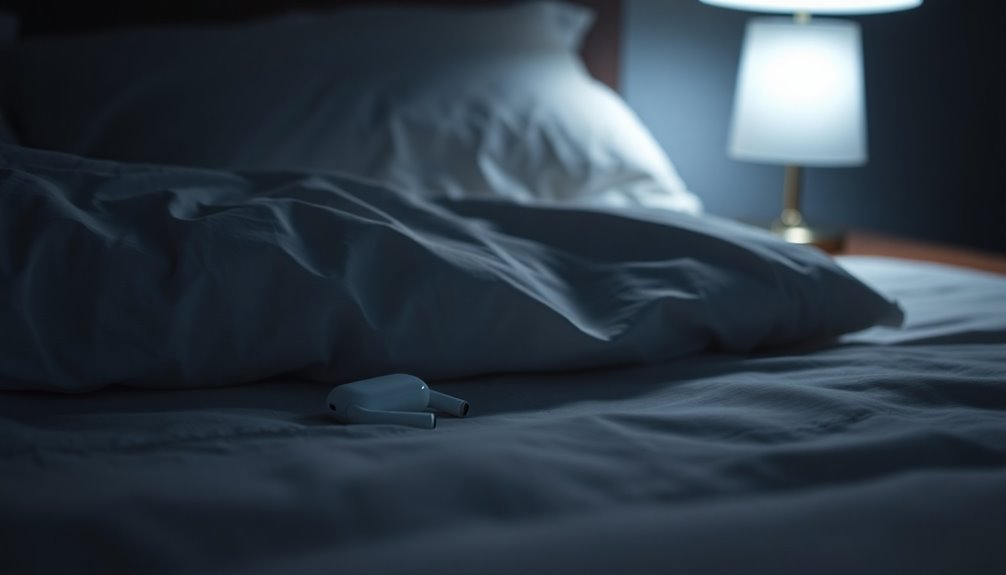
Finding effective alternatives for sleep can greatly enhance your nightly routine. If you're looking to improve your sleep quality, consider natural sleep aids like melatonin, which can help reduce wake time during the night. Magnesium promotes relaxation, while valerian root has been traditionally used to ease stress and promote better sleep. Tryptophan, taken at a dose of at least 1g daily, can also improve your sleep experience. Research indicates potential benefits for insomnia and sleep disturbances when using CBD, making it another option worth exploring. Additionally, prioritizing balanced nutrition can support better sleep by fueling your body with essential nutrients. Incorporating anti-inflammatory herbs like turmeric may also contribute to relaxation and improved sleep quality due to their calming effects. Engaging in regular low-impact exercises like hula hooping can also promote better sleep by reducing stress levels. Furthermore, utilizing the power of subconscious alignment during sleep can enhance your overall rest and manifest your desires more effectively.
If you prefer a tech approach, sleep-focused earbuds like Ozlo Sleepbuds or Soundcore Sleep A20 are designed for comfort and noise-masking, making them great companions for a restful night. The Bose QuietComfort earbuds offer advanced noise-cancelling technology that helps create a peaceful environment.
For those struggling with sleep apnea, consider CPAP alternatives like oral appliances or positional therapy that encourage side sleeping. Making simple adjustments to your sleep environment, such as using white noise machines or ensuring your earbuds are clean, can also enhance your sleep quality. By exploring these alternative solutions, you can find what works best for you and enjoy more restful nights.
Risks of Long-Term Use

Long-term use of AirPods while sleeping can pose several risks that affect both your ear health and overall well-being. One major concern is ear health and hygiene. Keeping AirPods in for extended periods can lead to the accumulation of earwax and moisture in your ear canal, creating a breeding ground for bacteria and increasing your risk of ear infections. If you don't clean your earbuds regularly, you could exacerbate these issues. Additionally, regular cleaning of earbuds is essential to maintain hygiene and prevent the growth of harmful bacteria. Regular cleaning of air purifiers can also reduce the risk of allergens affecting your overall health while you sleep. Moreover, maintaining optimal performance of your devices can help minimize potential health risks associated with prolonged use. Consistent hygiene practices, similar to those emphasized in fitness center operating hours guidelines, are important for preventing complications. Engaging in interactive learning toys can also support cognitive development, making it crucial to prioritize hygiene in all aspects of your life.
There's also the potential for hearing damage. Listening at high volumes can lead to noise-induced hearing loss, and prolonged exposure to sounds above 85 decibels can be particularly harmful. Prolonged exposure to loud sounds can even cause irreversible hearing damage, which is an important consideration when using AirPods for sleep. Even lower volumes can strain your ears over time, increasing the risk of tinnitus.
Physical discomfort is another risk, especially for side-sleepers. You might experience ear pain or soreness, or even risk dislodging the AirPods and injuring yourself. Additionally, safety concerns like battery malfunction and exposure to electromagnetic radiation from Bluetooth devices further complicate the issue. As research continues, the long-term effects of these factors remain uncertain, making it crucial to consider your habits when using AirPods for sleep.
Recommendations for Safe Use
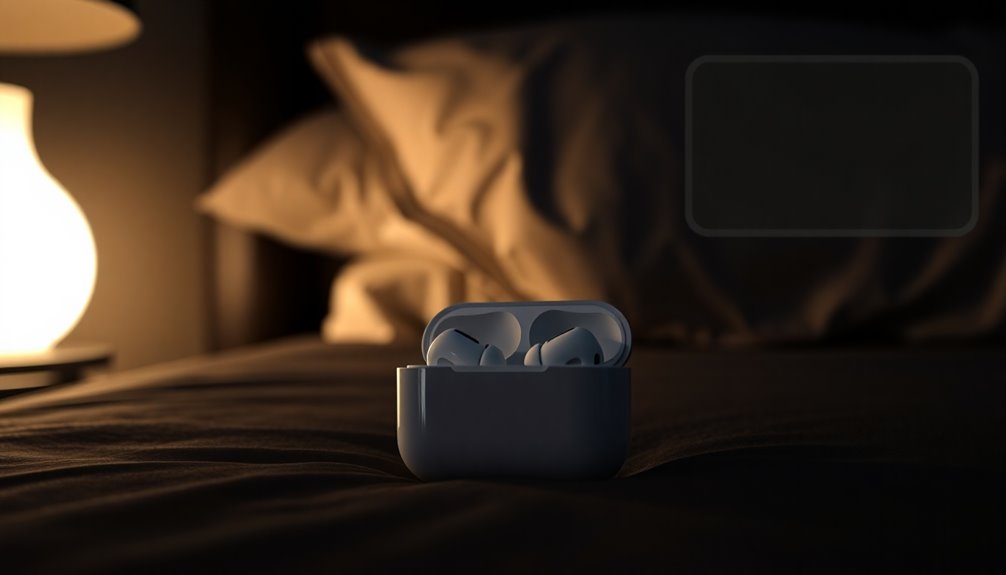
To enjoy your AirPods safely while sleeping, it's essential to prioritize comfort, hygiene, and hearing health. Start by regularly cleaning your AirPods to prevent debris and earwax buildup, which can affect performance and cause skin irritation. Use Apple Support guides for proper cleaning techniques, and always ensure your earbuds are moisture-free to minimize bacterial growth. Additionally, avoid charging with damaged cables to prevent potential hazards while using your AirPods during sleep. It's also important to consider the impact of improved air quality on your overall well-being, as better indoor air can enhance sleep quality. Maintaining a clean environment can also reduce allergens and pollutants, contributing to a more restful night. Proper indoor air quality can also support sustainability goals through energy-efficient technology. Regular cleaning and servicing can help ensure your AirPods remain in optimal condition, allowing you to enjoy them safely. Furthermore, the integration of AI in cybersecurity measures can help protect your devices from potential vulnerabilities.
For comfort, choose earbuds designed specifically for sleep. Opt for soft, flexible tips made from silicone or memory foam, and consider a design that fits your ear size securely without causing pressure points.
When it comes to volume, keep it below 70 dB to avoid hearing damage. Adjust the volume using your iPhone settings and refrain from cranking it up in noisy environments. Remember to give your ears periodic breaks, even while sleeping.
General safety precautions are crucial, too. Avoid sleeping on the charging case or cables, and keep AirPods away from small children. Be cautious of potential battery issues, and always avoid using damaged earbuds. By following these recommendations, you can enjoy your AirPods while safeguarding your health and comfort.
Frequently Asked Questions
Can I Use Airpods While Exercising or Working Out?
You can definitely use AirPods while exercising, but there are some important things to keep in mind. Make sure to clean them after each workout to prevent moisture buildup and potential infections. Also, avoid cranking up the volume too high, as it can affect your awareness of your surroundings. If you're in a busy or hazardous environment, consider using one earbud or switching to over-the-ear headphones for better safety.
How Often Should I Clean My Airpods?
You should clean your AirPods every 72 hours of usage, which usually means once a week for regular users. If you notice dirt or wax buildup, clean them sooner. Use a lint-free cloth and a fine-edged tool like a toothpick. For stubborn stains, gently apply 70% isopropyl alcohol. Regular cleaning prevents germs, sweat, and bacteria buildup, ensuring your AirPods stay comfortable and perform optimally.
Do Airpods Affect My Ability to Hear Alarms?
Yes, AirPods can affect your ability to hear alarms. If you're using Active Noise Cancellation, it might block out important sounds like alarms. Even with adjustments, you may still miss critical alerts. Alarms can be excessively loud, potentially causing ear strain or damage if you're not careful. To ensure you hear alarms, consider customizing your settings or using a separate alarm device instead. Stay mindful of your hearing health while using your AirPods.
Are There Any Safe Volume Levels for Listening?
When it comes to safe volume levels for listening, you should keep the volume below 60 decibels to protect your hearing. Use your device's features to limit maximum volume, aiming for no more than 85 decibels. Stick to the 60/60 rule: listen at 60% volume for 60 minutes, then take breaks. Regularly checking your listening habits helps reduce the risk of hearing damage while ensuring you enjoy your audio experience safely.
What Are the Best Alternatives to Airpods for Sleeping?
If you're looking for the best alternatives to AirPods for sleeping, consider sleep-specific earbuds designed for comfort. Options like the Bose QuietComfort Ultra or Beats Fit Pro offer great sound quality and noise cancellation while ensuring a secure fit. You might also try the Anker Soundcore Liberty 4 NC for affordability and comfort. These choices provide a lighter, more comfortable experience, making them perfect for restful nights without sacrificing sound quality.
Conclusion
Sleeping with AirPods in might seem convenient, but it comes with risks you shouldn't ignore. From potential ear infections and hearing damage to discomfort and safety concerns, it's essential to weigh the downsides. If you're struggling to sleep, consider exploring alternative solutions that won't jeopardize your ear health. Prioritizing your well-being means being mindful of your habits, so listen to your body and make informed choices for a better night's rest.
